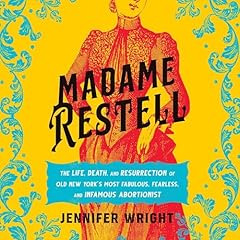
Rabid
A Cultural History of the World’s Most Diabolical Virus
No se pudo agregar al carrito
Add to Cart failed.
Error al Agregar a Lista de Deseos.
Error al eliminar de la lista de deseos.
Error al añadir a tu biblioteca
Error al seguir el podcast
Error al dejar de seguir el podcast
Compra ahora por $19.10
-
Narrado por:
-
Johnny Heller
A maddened creature, frothing at the mouth, lunges at an innocent victim—and with a bite, transforms its prey into another raving monster. It’s a scenario that underlies our darkest tales of supernatural horror, but its power derives from a very real virus, a deadly scourge known to mankind from our earliest days. In this fascinating exploration, journalist Bill Wasik and veterinarian Monica Murphy chart four thousand years in the history, science, and cultural mythology of rabies.
The most fatal virus known to science, rabies kills nearly 100 percent of its victims once the infection takes root in the brain. A disease that spreads avidly from animals to humans, rabies has served as a symbol of savage madness and inhuman possession throughout history. Today, its history can help shed light on the wave of emerging diseases—from AIDS to SARS to avian flu—with origins in animal populations.
From Greek myths to zombie flicks, from the laboratory heroics of Louis Pasteur to the contemporary search for a lifesaving treatment, Rabid is a fresh, fascinating, and often wildly entertaining look at one of mankind’s oldest and most fearsome foes.
Bill Wasik is a senior editor at Wired magazine and was previously a senior editor at Harper’s, where he wrote on culture, media, and politics. He is the editor of the anthology Submersion Journalism and has also written for Oxford American, Slate, Salon, and McSweeney’s.
©2012 Bill Wasik and Monica Murphy (P)2012 Blackstone Audio, Inc.Los oyentes también disfrutaron:




















Reseñas de la Crítica
Las personas que vieron esto también vieron:


















There is something about the narrator that I don't like, but I can't quite put my finger on it. It may just be that he narrated another audiobook I didn't enjoy, but it wasn't exceptional.
Overall, I would highly recommend this book to anyone who enjoys popular science writing, medical nonfiction, or social/cultural histories. It would appeal to a much larger audience than it may appear at first glance.
Totally Fascinating
Se ha producido un error. Vuelve a intentarlo dentro de unos minutos.
Would you listen to Rabid again? Why?
I already have. It's a scientific story without being sluggish or confusing. It's more than just a book about rabies, it's a series of stories.Any additional comments?
Rabies is one of those things that I've heard about all my life but I never really learned about it. The extent of my knowledge was that it was fatal and it made animals aggressive and foamy. I had no idea how completely terrifying it is, and what a serious issue it is. I can assure you that I am 100% positive that my cats are all up to date on their rabies shots now.Horrifying and fascinating
Se ha producido un error. Vuelve a intentarlo dentro de unos minutos.
Potentially dull book saved by narrator
Se ha producido un error. Vuelve a intentarlo dentro de unos minutos.
Would you listen to Rabid again? Why?
No. I don't listen to books again. Too many other good books are waiting to be read.What was one of the most memorable moments of Rabid?
The historical ways others treated rabies,What aspect of Johnny Heller’s performance would you have changed?
Nothing. He did well.Did you have an extreme reaction to this book? Did it make you laugh or cry?
No.Interesting history of a deadly disease
Se ha producido un error. Vuelve a intentarlo dentro de unos minutos.
Any additional comments?
I really enjoyed this book. Binged the entire thing in a few days. It brings in science, history, and culture nicely as it recites the history of rabies. It never feels dry, rushed, or moving slow, it is aware of the serious matter, but isn't dark or gloomy, but overall has a hopeful tone.Nice mix of history, science, and culture
Se ha producido un error. Vuelve a intentarlo dentro de unos minutos.

